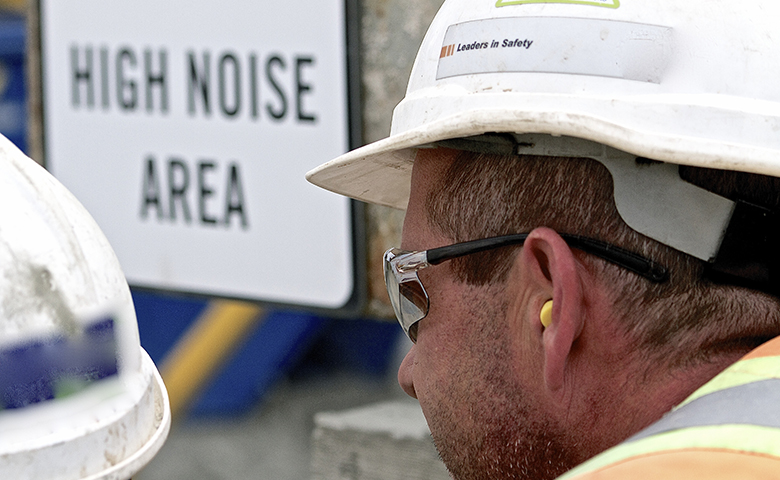National Protect Your Hearing Month is observed annually in October. You may not think hearing loss is a big problem, but it’s not just people who work with heavy machinery who are at risk of permanently damaging one of their five senses. Hearing loss is a 24/7 problem that happens both at work and at home—or wherever else you may be when you’re off the clock.
According to the National Institute for Occupational Health & Safety (NIOSH), hearing loss is actually the third most common chronic physical health condition among adults, after high blood pressure and arthritis.
Some people may not want to admit they have trouble hearing, and that denial means hearing loss often goes untreated. In fact, Dr. Frank R. Lin, who heads the Cochlear Center for Hearing and Public Health at the Johns Hopkins Bloomberg School of Public Health, determined that 85 percent of people with hearing loss are left untreated. But poor hearing is not just a minor inconvenience. The longer people wait to get their hearing testing and start treatment, the harder the hearing loss is to treat.
A lack of understanding and belief in the myths surrounding hearing loss is a big part of the problem. One myth is that hearing loss is always temporary and that only very loud noises are harmful. In reality, the risk from noise exposure is dependent on several factors, such as the sound’s intensity (decibel level), length of exposure and how often you’re exposed. Extended exposure to noise levels above 85 decibels can cause permanent hearing loss. If you’re like most people, encountering sustained 85 decibel sounds is common—it’s the equivalent of a noisy restaurant or hotel lobby, inside an airport or a roadway with heavy traffic. But even then, the maximum time one can safely endure 85 decibels is 8 hours. If you live or work near any of these loud places, you may want to consider hearing protection.
Another common myth surrounding hearing loss is that your ears will “get used to” loud noises. Your ears don’t react the same way your nose does when exposed to smells, becoming nose blind (when odors are no longer noticeable after prolonged exposure).
Here are a couple of other myths that people believe, increasing the risk of hearing loss:
Myth: I’m not old or around loud noises often, so I am not at risk of hearing loss.
Fact: Age and noise exposure are definitely the most common causes of hearing loss, but several other contributing factors might surprise you. Ear infections can damage the inner ear, especially if left untreated. And while most people aren’t shocked to hear about ear infection-related hearing loss, what about smoking and vaping? Studies show that smoking and vaping both have negative effects on hearing. The smoke can irritate your middle ear lining, which makes you more susceptible to noise-induced hearing impairment.
Stress and anxiety are other causes of temporary and permanent hearing loss. Stress releases a hormone called cortisol, which causes inflammation throughout your body, including in your middle ear. Stress can also weaken the immune system and lead to temporary hearing impairment. Over time, chronic stress can lead to more serious medical conditions, resulting in permanent auditory damage. Hypertension, diabetes, and heart disease can cause damage to the tiny blood vessels in the inner ear, and obesity can also exacerbate conditions that bring on hearing loss.
Myth: Hearing loss doesn’t affect the rest of my health.
Fact: Hearing loss can significantly impact your state of mind. Struggling to hear can be exhausting, literally. The cognitive strain of trying to process hearing loss causes mental fatigue. The fatigue that comes from straining to hear will trickle down into the rest of your life, making you more vulnerable to the risk of injury. It can also contribute to the development of new health conditions.
Untreated hearing loss can also result in stress and frustration. And if you don’t adjust for that stress and frustration, it could lead to injury-causing errors. SafeStart’s Stress and Safety handout states: “When people are stressed, they pay less attention. And when people don’t pay attention to what they’re doing, they’re more likely to get injured. Stress makes people rush more and get more easily frustrated. It also makes people more susceptible to fatigue and more likely to become complacent. In short, stress gets people hurt and killed.” Stress management is important to maintain a healthy existence, so it’s important to protect your hearing.
The first step to protecting your ears is early recognition of hearing loss. According to NIOSH, signs of hearing loss include:
- Having difficulty hearing when there is background noise.
- Thinking people are mumbling when they talk to you.
- Asking others to repeat themselves often.
If you’ve brushed off these signs as nothing, maybe it’s time to talk to your doctor about hearing loss.
Share this information with your facility this October—either as a toolbox talk, as a printed handout or in a digital display presentation—to provide people with more information about hearing loss. Recognizing these issues as common and addressing the problem can prevent hearing loss from worsening.

